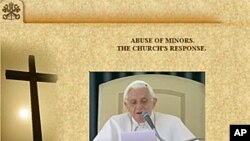The Vatican announced on Monday that bishops and other Roman Catholic church officials must report clerical sex abuse to law enforcement authorities. The Vatican posted a new guide on the Internet for lay people.
As pressure mounts on the Catholic Church over its handling of sexual abuse cases by priests and with Pope Benedict XVI also being criticized for his response to the crisis, a new guide for lay people was posted on the Vatican's Web site. It makes clear that suspected abuse by priests must be reported to the police.
Vatican scholar Marco Politi says these guidelines are short and simple as opposed to the 2001 norms on how to deal with cases of sexual abuse by priests that were written for bishops and canon lawyers.
"These guidelines are very important not only from a practical point of view because they tell exactly what a bishop has to do, but also because they show the determination of the Pope to follow the zero tolerance line," said Marco Politi. "The Pope wants the victims to be listened to. The Pope wants that nothing has to be covered up from now on. And the Pope wants that these priests are punished, are removed and are brought before state courts."
As outlined in the online guide, bishops should investigate every allegation and any accusation with "a semblance of the truth" that is referred to the Congregation for the Doctrine of the Faith. This enforcement body - once run by Cardinal Joseph Ratzinger, now Pope Benedict - is being criticized by those representing victims of abuse for having responded too late or too leniently.
Again, Marco Politi:
"The Congregation for the Doctrine of the Faith, of course, has always worked with great secrecy," he said. "And now it is in a transition. It must also learn to be quick in answering the issues, to be very transparent in its policy and also to give exact figures."
But the latest effort by the Vatican has done little to appease victims of sexual abuse. The U.S.-based Survivors' Network of those Abused by Priests is calling for "deeds, not words" and says "church policies, whether online or not, are largely irrelevant" because bishops could easily ignore them.
The editor of the Vatican newspaper l'Osservatore Romano, Giovanni Maria Vian, on Monday defended Pope Benedict as a "great communicator." He said there is a media campaign against the Pope and he criticized poor standards of reporting.
Vatican Posts Online Guide Against Sexual Abuse by Clergy




